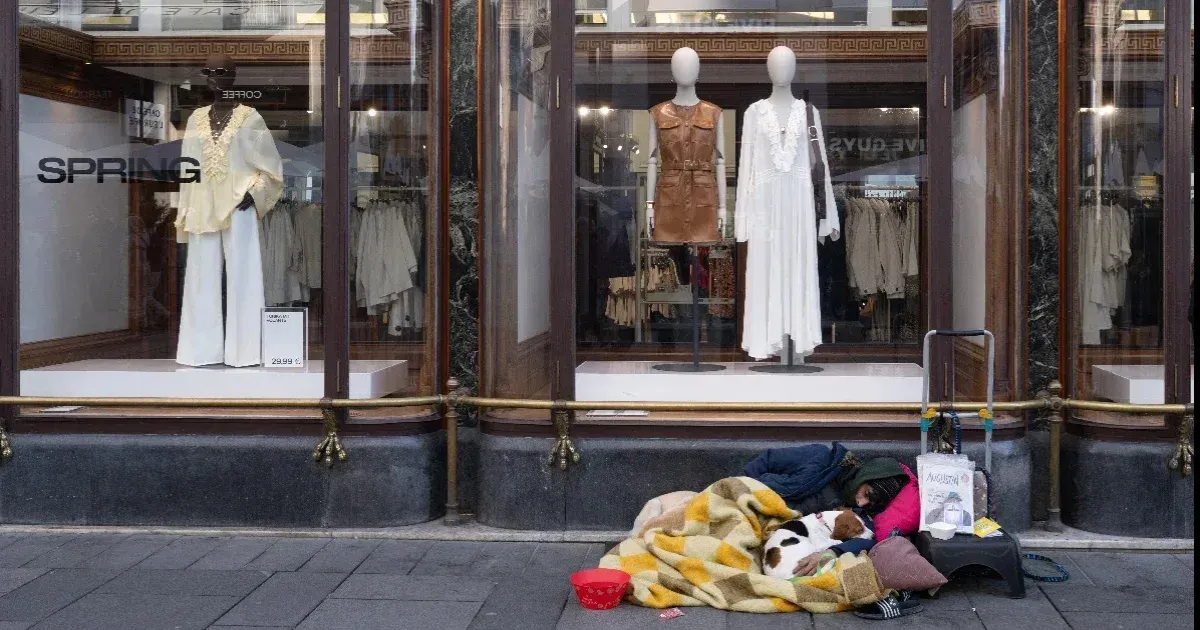
The Struggle of Hungarians on the Streets of Vienna
Mariahilfer Straße, a bustling 1.8-kilometer-long street in Vienna, has long been a symbol of prosperity and opportunity for many. For Hungarians, it holds a special place in their memory, often first mentioned during childhood as a destination where one could find better opportunities. Before the fall of communism, it represented the allure of the Western market economy. Even today, many Hungarians visiting Vienna make sure to visit this iconic street.
However, for some Hungarians, Mariahilfer Straße is not just a place of shopping or sightseeing—it is a daily struggle for survival. Many live on the streets, sitting in front of neat shop windows, waiting for euros to be dropped into their paper cups. As the second-largest group of EU homeless people in Austria after Slovaks, these individuals often arrive in search of a better life but end up on the streets due to various challenges.
Personal Stories from the Streets
One such individual is András, a middle-aged man who has lived on the streets since 1990. He recalls being driven out of Hungary and having no home to return to. He worked as a cook in Austria before ending up homeless again. Today, he earns only a few euros a day, struggling to survive without documents or a stable income. Another woman, around 55 years old, has been living in Vienna for ten years, carrying all her belongings in a shopping cart. She refuses to go back to Hungary, stating that there is nothing left for her at home.
A 28-year-old man, who has a child and lives in Vienna, shares his story of coming to the city to earn money for his family. He spends nights in the park, unsure of where the shelters are. His experience highlights the challenges faced by many homeless individuals who lack language skills and job training.
Understanding the Causes
In 2024, approximately 11,000 homeless and unhoused people were registered in Vienna, though the data is not fully reliable. According to Markus Hollendohner, head of the Vienna Social Fund for the Homeless, the reasons behind homelessness among foreigners, including Hungarians, are complex. One key factor is the criminalization of homelessness in neighboring countries like Hungary, where living on the streets became illegal in 2012. This law, which remains in effect, has pushed many individuals to seek refuge in Austria.
Vienna, in contrast, takes a more supportive approach to homelessness. There are numerous aid organizations providing assistance, including Caritas, the Red Cross, and others. These organizations offer services such as hot meals, counseling, and access to housing. In 2023 alone, over 12,750 people used the services of Vienna's homeless assistance providers, with the city spending around 142 million euros on these efforts.
Support Systems and Challenges
Homeless individuals from EU countries often arrive at counseling centers in Vienna, where they can seek help. A Hungarian advisor working with these individuals explains that many come with unrealistic expectations about finding work and earning money. Some are lured by fake job offers on social media, only to end up stranded at Hauptbahnhof with no language skills or support. These cases highlight the need for better information and support systems for those arriving in Vienna.
The advisor also mentions that many clients arrive pregnant, hoping for Austrian citizenship and family benefits, which are not automatically granted. Additionally, there is a lack of care for chronically ill homeless individuals, making it difficult for them to access necessary medical services.
A Unique Approach: Neunerhaus Café
One of the most unique places in Vienna’s homeless care system is the Neunerhaus café. Opened in 2018, it provides warm meals, coffee, and a welcoming environment for anyone in need. The café also includes a health center and a veterinary clinic, offering essential services to those without insurance. The staff at Neunerhaus emphasize treating everyone as equals, creating a space where people can feel safe and supported.
A Story of Hope
Alexandra, a 19-year-old from Vienna, shares her journey of overcoming hardship. Born in Vienna, she grew up in Slovakia and spent time in a children's home. Despite her challenges, she now lives in a shelter and is working towards a better future. Her story reflects the resilience of many homeless individuals who find hope in small moments of support and stability.
Addressing Homelessness in Europe
As right-wing rhetoric gains ground in Europe, homeless individuals are increasingly being scapegoated. Experts warn that public discourse often portrays homeless people as a security risk, despite the fact that they are more vulnerable to violence and discrimination. While Vienna offers some of the best support systems for the homeless in Europe, there is still much work to be done.
According to the Lisbon Declaration, homelessness should be eliminated in the EU by 2030. However, experts believe this goal is unrealistic without greater European cooperation and investment in housing and support services.
Ultimately, the stories of those living on the streets of Vienna remind us of the human dignity and resilience that exist even in the most challenging circumstances. Through continued support and understanding, there is hope for a better future for all.


Posting Komentar